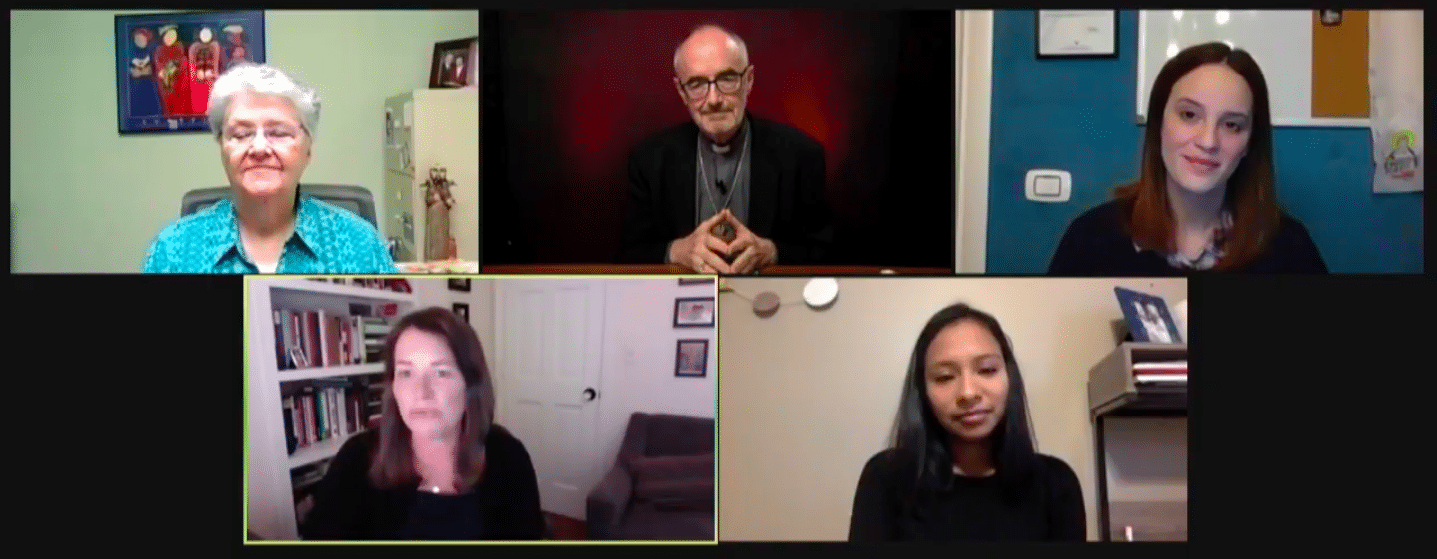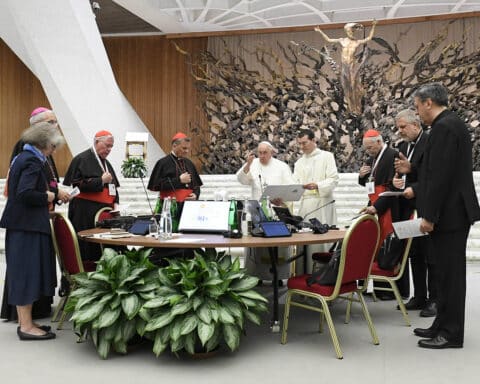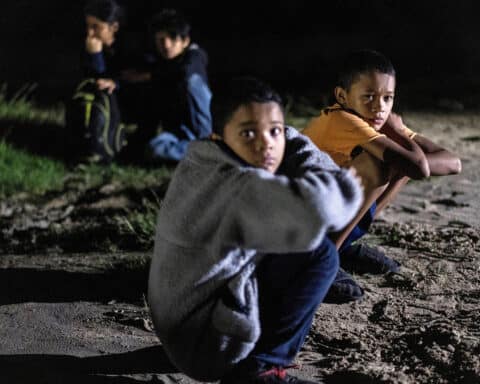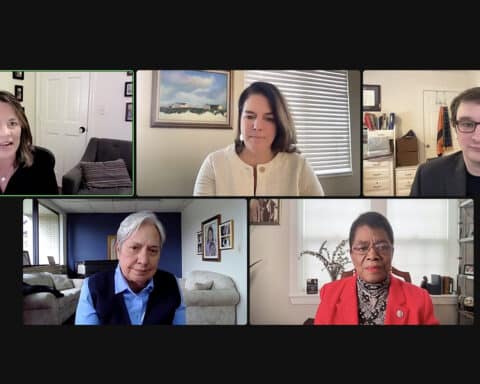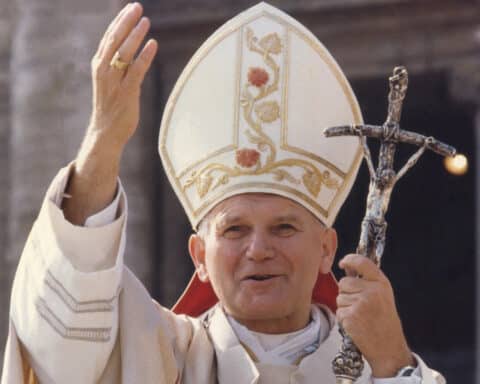A Vatican official says Pope Francis’ new encyclical, Fratelli Tutti (unofficially translated “Brothers All”), pushes back on the idea that many today have accepted, without realizing it, that they are “self-made, prosperous orphans.”
“We’re self-made; we don’t recognize God as our creator. We’re prosperous; we deserve everything we consume and have. And we’re orphans; we’re unconnected, we’re totally free, (but) we’re actually alone,” said Cardinal Michael Czerny, SJ, the undersecretary of the Migrants and Refugees Section of the Dicastery for Promoting Integral Human Development.
Cardinal Czerny, a close adviser of Pope Francis, expounded on the encyclical’s themes of solidarity, fraternity, dialogue and encounter during an online panel hosted Monday by Georgetown University’s Initiative on Catholic Social Thought and Public Life.
Speaking Monday, a day after the document’s release on the feast of St. Francis of Assisi, Cardinal Czerny drew parallels between Pope Francis’ third encyclical, which he signed amid the coronavirus pandemic, rising nationalism and growing political animosity, Pope Pius XII’s Christmas messages during World War II and Pope St. John XXIII’s encyclical Pacem in Terris (“Peace on Earth”), which he released in April 1963, six months after the Cuban missile crisis.
“I think you need to recover that feeling in your stomach, in your whole being, to appreciate Fratelli Tutti,” said Cardinal Czerny, who added that the world needs to “hear a message comparable” to what it heard during crises such as the Sept. 11, 2001, terror attacks or the global financial crash of 2008.
“We’re on the brink,” the cardinal said. “We need to pull back in a very human, in a very worldwide and in a very local way.”
Pope Francis says in Fratelli Tutti that he aimed to offer “a new vision of fraternity and social friendship” that he hopes will extend from the family at home to wider communities, impacting all human activity and changing the way people view and engage with politics, culture and the global economy.
“Pope Francis has brought the Gospel and Catholic Social Teaching, with its priority for the poor and the marginalized, its focus on solidarity, community and interconnectedness, to this pivotal moment,” said Kim Daniels, the associate director of Georgetown University’s Initiative on Catholic Social Thought and Public Life and a member of the Vatican Dicastery for Communication.
Daniels, who moderated the virtual dialogue, described Fratelli Tutti as “a powerful expression of faith in a time of doubt, a call of hope in a time of fear and a challenge to love in a time of anger and division.”
In Fratelli Tutti, Daniels said, Pope Francis “explores many themes,” among them “holding the vulnerable and marginalized close and putting them first, going out to the margins, resisting an economy of exclusion and the throwaway culture, finding an alternative to destructive populist nationalism, responses to war and violence.”
Daniels added that the pope “asks us to extend fraternity from our own families to a suffering world, and to expand friendship from the personal to the political and the global.” In Paragraph 137, Pope Francis emphasizes that radical interconnectivity, writing that people must realize that “nowadays we are either all saved together or no one is saved.”
“This encyclical would be a good introduction to Pope Francis for those who don’t know him,” said Claire Giangravé, the Vatican correspondent for Religion News Service who participated in the virtual panel.
As a journalist, Giangravé said Fratelli Tutti is “a challenge” in that it can’t be boiled down to “juicy” quotes or a catchy headline. She said the pope wrote the document in a manner to encourage a thorough, careful reading.
“He calls us to look for ways to have sincere dialogue with people,” said Giangravé, who added that Pope Francis underscored that people “can keep what we have in our cultures and experiences without being afraid to engage with others.”
Edith Avila Olea, an immigrant advocate in Chicago, told the panel that she felt affirmed by the Holy Father’s statements in Fratelli Tutti that solidarity and fraternity transcend national borders, and that migrants and refugees should be treated and welcomed with respect and charity.
“I felt very listened to. … I felt that our pain, our suffering as an immigrant community in the U.S. isn’t going in vain, that it’s being heard,” said Olea, who described herself as “a Dreamer” whose parents brought her to the United States when she was only 8 months old. Amid a time when anti-immigrant rhetoric and policies are on the rise, Olea said Fratelli Tutti assures people like her that they are not alone and not forgotten.
“For me it was a moment of assurance,” Olea said. “God in a way was saying, ‘I’m here, mija. I see you. I hear you.’ That for me was a very powerful voice from the Church.”
Sister Nancy Schreck, OSF, the program director of Excel Inc., told the Georgetown panel that Fratelli Tutti gave her “lots of encouragement” for her ministry serving a poor, rural community in Okolona, Mississippi.
“I felt such an affirmation of the direction of my life and what I feel committed to,” Sister Schreck said.
In going through the encyclical’s chapters and table of contents, Cardinal Czerny said that Pope Francis, while not dictating to nations how they should run their economies or political systems, did call for leaders to reestablish political control over the economy, rather than the other way around, so as to make sure that their economies serve people and not vice versa.
If Laudato Si’ (“Praise be to You”), the pope’s 2015 encyclical on integral ecology, taught that “everything is connected,” Cardinal Czerny suggested that Fratelli Tutti “teaches us that everyone is connected.”
Brian Fraga is a contributing editor for Our Sunday Visitor.

